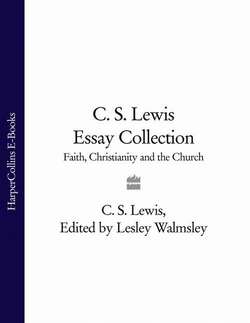Читать книгу C. S. Lewis Essay Collection: Faith, Christianity and the Church - Клайв Льюис, Клайв Стейплз Льюис, C. S. Lewis - Страница 15
[9] MUST OUR IMAGE OF GOD GO?
ОглавлениеTaken from The Observer (24 March 1963), this article was reprinted in The Honest to God Debate: Some Reactions to the Book ‘Honest to God’ with a new chapter by its author, J.A.T. Robinson, Bishop of Woolwich, edited by David L. Edwards (SCM Press, 1963). It was reproduced in Undeceptions (1971) and God in the Dock (1998).
The Bishop of Woolwich will disturb most of us Christian laymen less than he anticipates. We have long abandoned belief in a God who sits on a throne in a localised Heaven. We call that belief anthropomorphism, and it was officially condemned before our time. There is something about this in Gibbon. I have never met any adult who replaced ‘God up there’ by ‘God out there’ in the sense ‘spatially external to the universe’. If I said God is ‘outside’ or ‘beyond’ space-time, I should mean ‘as Shakespeare is outside The Tempest’; i.e., its scenes and persons do not exhaust his being. We have always thought of God as being not only ‘in’ and ‘above’, but also ‘below’ us: as the depth of ground. We can imaginatively speak of ‘Father in Heaven’ yet also of the everlasting arms that are ‘beneath’. We do not understand why the Bishop is so anxious to canonise the one image and forbid the other. We admit his freedom to use which he prefers. We claim our freedom to use both.
His view of Jesus as a ‘window’ seems wholly orthodox (‘he that hath seen me hath seen the Father’ [John 14:9]). Perhaps the real novelty is in the Bishop’s doctrine about God. But we can’t be certain, for here he is very obscure. He draws a sharp distinction between asking ‘Does God exist as a person?’ and asking whether ultimate reality is personal. But surely he who says yes to the second question has said yes to the first? Any entity describable without gross abuse of language as God must be ultimate reality, and if ultimate reality is personal, then God is personal. Does the Bishop mean that something which is not ‘a person’ could yet be ‘personal’? Even this could be managed if ‘not a person’ were taken to mean ‘a person and more’–as is provided for by the doctrine of the Trinity. But the Bishop does not mention this.
Thus, though sometimes puzzled, I am not shocked by his article. His heart, though perhaps in some danger of bigotry, is in the right place. If he has failed to communicate why the things he is saying move him so deeply as they obviously do, this may be primarily a literary failure. If I were briefed to defend his position I should say ‘The image of the Earth-Mother gets in something which that of the Sky-Father leaves out. Religions of the Earth-Mother have hitherto been spiritually inferior to those of the Sky-Father, but, perhaps, it is now time to readmit some of their elements.’ I shouldn’t believe it very strongly, but some sort of case could be made out.
